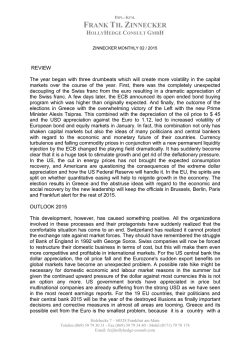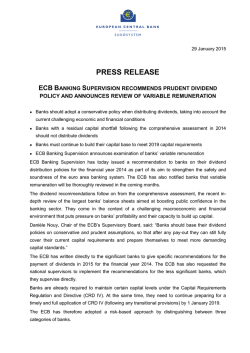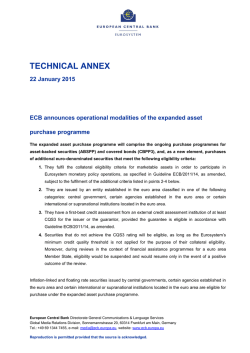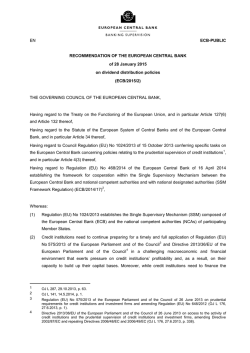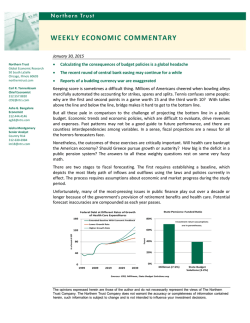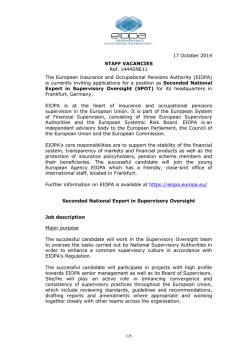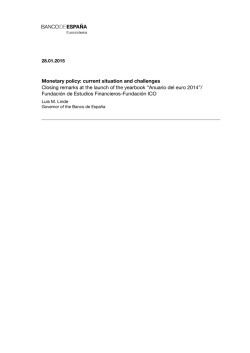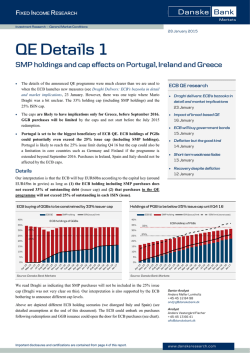
Letter from Danièle Nouy, Chair of the Supervisory Board, to Mr De
Danièle NOUY COURTESY TRANSLATION Chair of the Supervisory Board Mr Fabio De Masi Member of the European Parliament European Parliament 60, rue Wiertz B-1047 Brussels Frankfurt am Main, 2 February 2015 Re: Your letter (QZ62) Honourable Member of the European Parliament, dear Mr De Masi, Thank you for your letter which was passed on to me by Mr Roberto Gualtieri, Chairman of the Committee on Economic and Monetary Affairs, accompanied by a cover letter dated 22 December 2014. The recruitment processes for the supervisory function of the European Central Bank (ECB) were aimed at recruiting employees with the highest level of competence, efficiency and integrity. The same stringent standards that apply to all ECB staff recruitment were used for these processes. The requirements with respect to previous professional experience were broad, as the ECB was seeking an appropriate mix of relevant expertise from supervisory and private sector backgrounds. Consequently, the recruitment process for banking supervision staff included a detailed online application questionnaire, a verification of the minimum requirements for the position advertised, written tests, the preparations of presentations to interview panels, as well as an interview with several ECB officials which probed previous professional experience. The interview process was geared towards assessing candidates’ technical and behavioural competencies and, where relevant, managerial skills. The professional experience of those who were successful is reflected in the figure below. 1 1 The numbers shown relate to the last previous employer of successful applicants (aggregated data is only available for the last previous employer). Note that a detailed review and evaluation of each candidate’s entire professional experience and expertise is, however, undertaken by the relevant selection committee. European Central Bank Tel.: +49 69 1344 0 60640 Frankfurt am Main E-mail: [email protected] Website: www.ecb.europa.eu Source: ECB. As the figure indicates, about three quarters of the new staff hired for the ECB’s banking supervision arm were last employed by a national competent authority (NCA) or an institution belonging to the European System of Central Banks, i.e. a national central bank (NCB) or the ECB. The remaining successful candidates came from an employer such as an auditing company, a consultancy, other financial institutions or academia (13%), an EU institution/international organisation or other public institution (7%), or from a commercial bank (7%). Having supervisory staff with a diversity of skills and backgrounds is considered conducive to the quality of supervision, as it allows for a more diverse set of knowledge, experience and perspectives to be taken into account. At the same time, a number of safeguards have been put in place to ensure that potential conflicts of interest do not arise from the previous employment of staff members. For the purpose of operational independence, objectivity and neutrality of supervisory decisions, an appropriate governance framework for carrying out supervisory tasks has been established, as explained in the Guide to banking supervision published on the ECB website. Potential conflicts of interest are also addressed through the Ethics Framework applicable to all ECB staff, which was, as you are perhaps aware, updated in view of the 2 assumption of the new supervisory tasks. Furthermore, in compliance with the SSM Regulation , a code of conduct for Supervisory Board members was adopted. The European Parliament has been provided with both the draft and final versions of these two documents. In addition, the ECB has assigned staff to Joint Supervisory Teams (JSTs) in a way which avoids potential conflict of interests. For example, a staff member may not work in a JST that supervises his/her previous employer. There are other internal rules which should limit the scope for problems on this front. Recently, the 2 Council Regulation (EU) No 1024/2013 of 15 October 2013 conferring specific tasks on the European Central Bank concerning policies relating to the prudential supervision of credit institutions (OJ L 287, 29.10.2013, p. 63). Page 2 of 3 ECB even adjusted its recruitment rules to ensure that there is no conflict of interest relating to the last two years of previous employment and the position for which a candidate has applied. In the context of the JSTs, emphasis is also placed on ensuring objectivity and neutrality of supervisory decisions. This is done by creating JSTs composed of both ECB as well as NCA staff. Moreover, the nationality of the JST Coordinator cannot be the same as of the home country of the bank under his or her supervision. In the same vein, JST members will rotate on a regular basis also in order to ensure strict, impartial and objective supervisory practices. As regards on-site missions, the Head of Mission is, as a rule, not a member of the relevant JST. Objectivity and neutrality are further enhanced by the following three levels of control for day-to-day supervisory activities: a competent management team, a quality assurance process and an audit function. With regard to the decision-making process, it is finalised at the Supervisory Board and Governing Council levels, where the Members, including representatives from all NCAs and NCBs, are also subject to strict ethical rules ‒ these include the duty to “act independently and objectively in the interest of the Union as a whole”. Furthermore, a dedicated Directorate General (DG) has been set up within the ECB’s banking supervision arm to perform a horizontal supervisory function. This DG is tasked, inter alia, with ensuring the quality of supervision, establishing uniform supervisory standards and the evaluation of supervisory practices. I am confident that we have highly qualified and diverse teams in place for effective prudential supervision, as well as all the necessary organisational safeguards to ensure that the ECB exercises its supervisory tasks in full independence, and avoiding potential conflicts of interest. Yours sincerely, [signed] Danièle Nouy Page 3 of 3
© Copyright 2026

